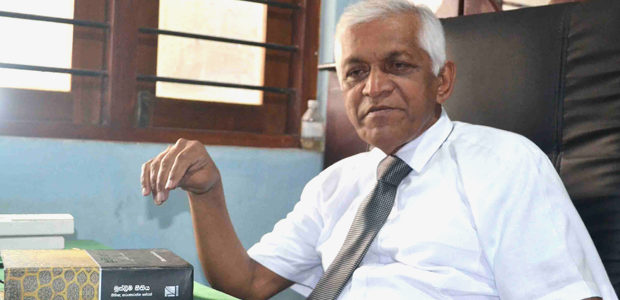In Conversation with Karunaratne Herath
It is wrong to say Islamic teachings are narrow-minded
As followers of other religions it is wrong to say Islamic teachings are narrow. It is interesting to note the depth of which the teachings of Allah have spread in a region where Buddhism, Hinduism and Christianity have already been established.
These are views of the Attorney-at-Law who compiled the ‘Hand book on Muslim Law’ at a time where there is intense dialogue changing the Muslim Law in the country. He is a non-Muslim who stood for Muslim tradition and law. In addition to being an author, lecturer and the President’s Counsel, an outstanding characteristic of his is that he saw the legal problems related to Muslim society at present. This is Karunaratne Herath’s exclusive interview with The Catamaran.
Karunaratne Herath is an outstanding name in Anuradhapura, as well as in the local legal field, due to the many books he has written. Among them are pieces on the devolution of power and provincial councils, law related to government lands, forest crimes, wildlife conservation law, human rights, and the book which brought fame worldwide, ‘Muslim Law.’
THE CATAMARAN – How do you view the foundation of Muslim law?
The foundation of normal Muslim life is a tradition called pre-Islam rituals. The other basic foundation for Muslim Law is the holy Quran. There are three main parts in these teachings. Those are the Shunna, Hadis and Ithma. They were first released in Arabic and have completely molded the Arabic civilian life. Although the teachings in these books have not been completely maintained today, the basis is there in the Islamic system.
The Mahawangsha states that when King Pandukabhaya established Anuradhapura, places were built for various religious groups like the Yonaka group and followers of other indigineous Gods. The Yonaka people embraced Islam in the 7th century. The leaders took measures to send a group, including a highly learned person from Sri Lanka, to study the teachings with the Khalif, the religious guardians.. Due to the transport system at that time, Nabi had passed away when they reached Arabia. His main worker returned with the learned knowledge. Islamic Law grew from that.
THE CATAMARAN- Many express their suspicion towards Islam religious teachings. Some believe it incites violence, what are your thoughts?
As followers of other religions it is wrong to say Islamic teachings are narrow. It is interesting to note the depth of which the teachings of Allah have spread in a region where Buddhism, Hinduism and Christianity have already been established. That depth could be understood when studying the Quran. At the time of Prophet Mohamed, women had rights similar to animals. It is through his teachings that women found a place in society with property rights and respect. He rescued women from slavery.
THE CATAMARAN- Can you show the context of Islam?
We can draw many links inbetween religions. As an example, ‘Sabbe Thasanthi Dandassa’ in Buddhism which means ‘all beings do not like to be punished’ is found in Prophet Mohamed’s teachings as ‘others also like to protect their lives.’
There wasn’t much value for human life in pre-Islamic societies, focusing only on earning money and trade. But with Islam, religion then recieved values. That is why Islam spread in the world.
THE CATAMARAN – Can you explain how Muslim Law is implemented in Sri Lanka?
Muslim law in Sri Lanka is applied only to a few sectors. Only three laws introduced by parliament are applied as Muslim law. One is the Muslim people’s marriage law relating to privacy or family relations. Second is the property law. The problem related to bequeath comes when the property owner dies without handing over or gifting the property to someone. The other law is charity aid law at mosques. These are the only three laws that are separately applicable to Muslims in Sri Lanka. Those who like to come under that law, can do so. If not their problems can be sorted out through the court system under the common law.
THE CATAMARAN- There were controversial statements from the Muslim community itself about the Qasi courts set up to implement Muslim law and its judges. How do you see that?
Judges of the Qasi courts to implement Muslim laws have been defined as being committed to god. There is a deep meaning in that. It is similar to a mediation board. Those who are appointed as Qasis should be qualified persons. Qasi council courts are functioning under the justice ministry. They are connected to normal courts. Although there are shortcomings under present circumstances, they are based on accepted principles.










